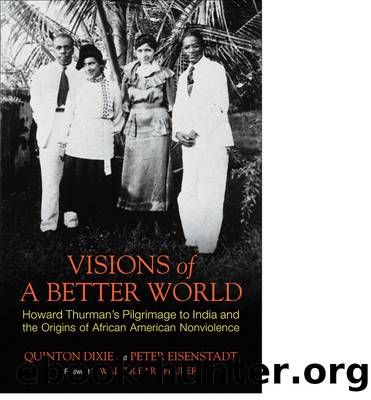Visions of a Better World by Quinton Dixie

Author:Quinton Dixie
Language: eng
Format: epub
Publisher: Beacon Press
Published: 2011-06-15T00:00:00+00:00
Chapter Five. What Thurman Learned from India
On Sunday morning, August 13, 1942, Howard Thurman met with a reporter, Peter Dana, from the Pittsburgh Courier, one of the nationâs most influential black newspapers. Thurman was staying at the Theresa Hotel in Harlem on his way back to Washington and Howard University from speaking engagements in New England. India was on his mind, as had been so often the case since his time in South Asia in 1935 and 1936. He had especially been thinking about it the previous week, since Gandhi and the Indian Congress Party had initiated their âQuit Indiaâ campaign, which called for immediate Indian independence. British authorities responded by promptly arresting Gandhi and the rest of the Congress Party leadership, and they would remain incarcerated for the remainder of the war. Thurman was outraged. âThere arenât enough jails in all India,â he told Dana, âto imprison the spirit of present day India that articulates itself in Gandhi and Nehru.â The âimperialist stubbornness of Britainâ had already reduced their claims of fighting for democracy to a âmoral absurdity.â As he would occasionally do during the war, Thurman muted his deep pacifist doubts about the entire enterprise to express a general sympathy with the Alliesâ professed war aims and argued that there was no way for this war to end, other than âthe freedom of all people and their equality under the law.â One cannot wage a war for freedom with Britainâs foot on the neck of the Indian people.1
Dana took stock of the âmodest, stocky, black man, with resonant voice and smiling countenanceâ he was talking to. He was, he told his readers, one of the best-known of contemporary speakers and thinkers in American colleges and universities, but not sufficiently known to the general public. Nonetheless, he wrote that Thurman had âprobably moved more cynical men and intellectual women than any other speaker of his generation.â Thurman was a mystic, but âa mystic with a practical turn of mind, with a thorough understanding of the economics and politics of the modern world,â and was âeasily one of the most brilliant and profound men in America.â In sum, Thurman represented a âChristian likeness of many of the best qualities of Gandhi and Nehru.â Indeed, Thurman was âone of the few black men in this country around whom a great, conscious movement of Negroes could be built, not unlike the great Indian movement with which Gandhi and Nehru are associated.â2
At the time Dana wrote his article, the black press had been casting envious glances at Gandhi and India for more than two decades; if Gandhi could create and summon a great nonviolent movement in India for freedom and citizenship, tying the British in knots, why couldnât American blacks create their own version, advancing their interests, confounding their tormentors? As of yet, this movement had no champion. Still there was much talk and the stirrings of action by A. Philip Randolph, head of the March on Washington Movement, members of the Fellowship of Reconciliation, and other troublers of Americaâs racial waters.
Download
This site does not store any files on its server. We only index and link to content provided by other sites. Please contact the content providers to delete copyright contents if any and email us, we'll remove relevant links or contents immediately.
The Lost Art of Listening by Michael P. Nichols(7506)
Why I Am Not A Calvinist by Dr. Peter S. Ruckman(4153)
The Rosicrucians by Christopher McIntosh(3521)
Wicca: a guide for the solitary practitioner by Scott Cunningham(3179)
Signature in the Cell: DNA and the Evidence for Intelligent Design by Stephen C. Meyer(3138)
Real Sex by Lauren F. Winner(3024)
The Holy Spirit by Billy Graham(2953)
To Light a Sacred Flame by Silver RavenWolf(2824)
The End of Faith by Sam Harris(2742)
The Gnostic Gospels by Pagels Elaine(2532)
Waking Up by Sam Harris(2461)
Nine Parts of Desire by Geraldine Brooks(2370)
Jesus by Paul Johnson(2363)
Devil, The by Almond Philip C(2333)
The God delusion by Richard Dawkins(2309)
Heavens on Earth by Michael Shermer(2285)
Kundalini by Gopi Krishna(2185)
Chosen by God by R. C. Sproul(2165)
The Nature of Consciousness by Rupert Spira(2108)
